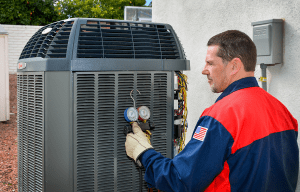Invest in Energy-Efficient Appliances
Start by upgrading to energy-efficient appliances. Air conditioners with the Energy Star label consume 10% less energy on average compared to conventional models. This investment not only lowers your energy bills but also reduces your carbon footprint.
Additionally, check into government rebates and incentives for purchasing these eco-friendly appliances, which could make the initial cost more manageable.
Smart Thermostats
If you’re wondering how to save money using a smart thermostat, Chas Roberts is here to help! Smart thermostats are a game-changer for managing your home’s climate while saving money. These devices learn your schedule and adjust the temperature accordingly, ensuring that you’re not cooling an empty house.
Homeowners can save up to 10% annually on heating and cooling by making these adjustments. Also, the integration of voice control features allows users to adjust settings simply by speaking, making the system even more user-friendly and accessible.
Check out home automation enhancements offered by Chas Roberts here.
Improve Your Home’s Insulation
Proper insulation is key to maintaining your home’s temperature. Check the insulation in your walls, attic, and floors. Upgrading your insulation can prevent heat from entering during the summer, which means your air conditioner won’t have to work as hard.
Additionally, good insulation also keeps warmth inside during the colder months, reducing the need for excessive heating. This not only enhances comfort but also lowers energy bills by improving your home’s overall energy efficiency.
Seal Cracks and Openings
Prevent warm air from creeping in by sealing cracks and openings around your home. Use weather stripping or caulk to seal doors and windows. This minor investment can pay off significantly by reducing your cooling needs, demonstrating how to save money on energy bills. Ensuring proper insulation in your attic and walls can further enhance this effect by keeping the cool air inside during the hot Phoenix weather.
Opt for Energy-Efficient Windows
Consider installing energy-efficient windows, especially if you’re dealing with the intense phoenix weather. These windows are designed to reflect more sunlight and absorb less heat without lowering the light quality. This means less reliance on air conditioning during the hottest hours of the day. By reducing energy consumption, new windows can significantly lower utility bills over time.
Use Ceiling Fans to Complement AC
Ceiling fans can be used in conjunction with your air conditioner to spread the cooled air more efficiently, ensuring it reaches every corner of the room. This allows you to raise the thermostat setting by about 4°F with no reduction in comfort.
The gentle breeze created by the fan enhances the effect of the air conditioning, making the room feel cooler than the actual temperature setting. Consequently, this strategy can also lead to significant energy savings, as the air conditioner does not need to work as hard to maintain a comfortable environment.
Block Out the Sun with Thermal Curtains
Thermal curtains can block out a significant amount of sun heat, naturally keeping your rooms cooler. During the hot Phoenix weather, especially during the hottest parts of the day, close these curtains to prevent heat gain and open them in the evening to let cooler air in. Additionally, these curtains also provide insulation during colder months, helping to retain warmth and reduce heating costs.
Maintain Your Cooling Systems
Regular maintenance of your air conditioning units and systems is essential. Ensure that the filters are clean and the coils are free of debris. Proper maintenance not only extends the lifespan of your appliances but also ensures they run at peak efficiency. Keeping these systems in optimal condition also reduces energy consumption, lowers utility bills, and shows how to save money effectively.

Consider Landscaping for Shade
Planting trees strategically around your home can provide natural shade and cool your home. Deciduous trees planted on the south and west sides will block sunlight in the summer but allow it through in the winter after they shed their leaves. It is advisable to check with your local Homeowners Association (HOA) before planting to ensure compliance with any community guidelines or restrictions.
Stay Hydrated and Cool
Lastly, personal cooling is just as important as cooling your home. Stay hydrated and consider using personal fans, which consume far less energy than AC units.

